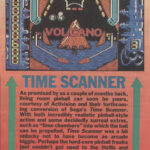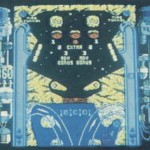
Yes, Time Scanner was actually released on the C64, and many of you can claim to own it. But how many of you can claim to own the version that should have been? Or should we say “versions”?
In July 1988, UK magazine Commodore User presented in their preview pages a promising Time Scanner conversion for our C64’s which looked something like this colourful shot we have in our gallery.
With the version that was released, we ended up with essentially a ZX Spectrum conversion, which bombed with all its reviews. There was also another screenshot which looked different in The Games Machine magazine, with different panels – but this turns out to have been a screenshot of the ZX Spectrum version, and a version for that platform that was never to be.
So what was going on? What was this strange multi-colour version that had been previewed? Did Activision do the same as with R-Type and bring in new coders? Well, it seems that was the case. Barry Leitch’s music for the game in later years also snuck out thanks to HVSC, who had also been involved in the earlier R-Type build that was cancelled.
We learnt that it was Catalyst Coders again who were behind the title, this time with Paul Cole as the developer (Who later went on to convert Strider on the C64). Chris Edwards was also on graphics duty. Interestingly though – Bob Pape’s book on R-Type suggests that both Jim Smart and David Jolliff were the original programmers on an aborted conversion – but Jim confirms he had no involvement on Time Scanner.
Paul had the following to say about the conversion, including excitingly how complete it was…
“It was near completion, but there were problems between Activision and Catalyst, We had attended a meeting on the morning it was pulled with Activision and they told us that it was still going ahead, we drove from Southampton to Portsmouth, by the time we got there, Activision had phoned up cancelling it. At that point, I was refused access to the PC to get any code.
The project was then sent to another company who messed it all up, What annoyed me was about 4 months after that, I got a call from Activision directly asking if I still had the code as my unfinished version was better than what they had.”
So, sadly Paul no longer has anything of what sounds like a far better game, but Chris Edwards may have something yet. It’s early days, but we’ll have to try and see what happens. Otherwise it could be case closed for this game. Some extra info from Games Machine 10-88 reveals that Time Scanner had suffered as a result of all the conversions that Mediagenic/Activision were trying to cover all at once.
We had wondered if the other team who had been brought in was ‘Foursfield’, who were the team behind Incredible Shrinking Sphere. In the ACE review of the game, it is stated that Foursfield were given the role of converting Time Scanner. However, after a comment from Martin Webb (who had coded the C64 conversion of Outrun), it seems that Foursfield were in fact the developers of the eventual released version.
Martin was the developer of the second version that took over from Paul and Chris’ edition. They were given the job and started from scratch, and originally the development was given to one of their in-house developers called Simon. Unfortunately, Simon hit problems with coding in the bouncing ball and collision detection, so Martin came on board to help out. However, Martin decided to pull out of the industry and the game was left in limbo.
It seems it was at this point that Activision in desperation had gone back to Paul Cole to see if he still had his code. When Paul confirmed he didn’t, Foursfield were likely brought in at the death and asked to knock out a conversion in record time. This would explain why the conversion was so poor, especially when to compare to the quality of Foursfield’s other works.
So, we have not one, but two earlier developments of Time Scanner to try and find. For the first version, it all hangs on Chris Edwards still having anything from back then. The second version will depend on if Martin has kept hold of anything. We hope that there will be positive news in the future to preserve something and see a small glimpse of what could have been.
Contributions: Martin / Stadium 64, Barry Leitch, Paul Cole, Martin Webb, Stephen Stuttard
Supporting content
Available downloads
- Music_Timescanner.zip (zip)
Gallery
Update history
- 26/04/24 – Improved scans and colour screenshot added thanks to Stephen Stuttard.
- 02/04/24 – Major overhaul of the write up and added in Martin Webb and Paul Cole’s new info.




Hi Martin,
the version you helped on with simon would have been the second version.
I worked on the original version for Catalyst Coders based in Portsmouth for activision. the day they cancelled it, myself and the developer for the spectrum original version were called into the offices in southampton to be told they were planning on pulling it, we went back to our offices by which time they had told catalyst that it was cancelled and catalyst refused us access to the PC with the source code on. About 6 months after leaving there Activision phoned me up to ask if I still had the original source code as my version which was about 90% complete was better than the second one, but I told them I didn’t have it.
Yes, I can tell you exactly what happened. I was the programmer of the second/first version. Martin Webb AKA Outrun. We one the contract from activision and used one of our in house guys to do the conversion. His name was Simon. He had real problems in coding the alog’s for the bouncing ball and the collision detection. I came on board and tried to help out, Sadly, and you can read more about my story, I pulled out of the business and the game was never delivered.
Thanks Martin, just emailed you – it would be good to find out more about your work and about this conversion, but I will get the credits updated.